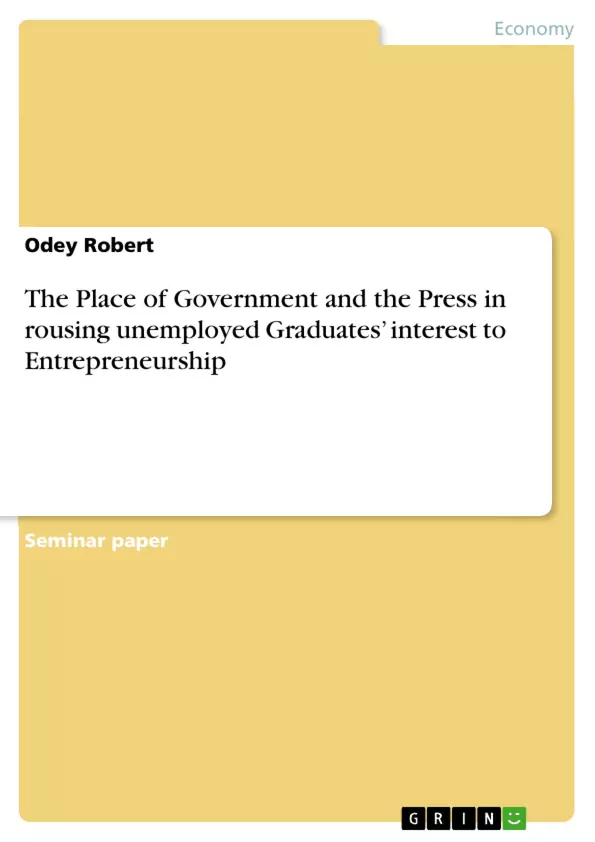The failure of both the government and the press in their supposed responsibilities to rouse the teeming populated unemployed graduates to entrepreneurship is the paramount reason for the current high rates of crimes, social vices and violence as the products of high unemployment in Nigeria. Nigerian graduates, especially those from the lower class, the poor, are now treated like nonentities that are stack illiterates. These underlying problems ground this study.
The study is aimed at exploring the extent to which government and the press have roused the interest of Nigerian youths, particularly the unemployed graduates, to entrepreneurship. The study reveals that: the government of all levels and the press have done little or nothing to rouse the interest of the unemployed graduates to entrepreneurship; existing entrepreneurs of this class often suffer severe capital issues, which discourages intending entrepreneurs, other unemployed graduates, as the government only aids those who have ‘people in Government House(s) and other high class offices’.
It maintains (recommends) that the best way for the government to rouse their interest to entrepreneurship is to drop lip-service and practically mobilise and support jobless youths to become self-employed and thus become automatically detached from all forms of social ills, having taking to it as an alternative. Then, the Press takes it up from there by making entrepreneurship a splash to the unemployed graduates and the general masses. The study is anchored on the psychological or entrepreneurial trait school and the managerial skills school cum the economic development theory. This study concludes that until the government and the press turn a new leave and practically and actively begin to rouse the interest of the unemployed graduates to entrepreneurship, as a practical alternative, unemployment would continue to increase alarmingly, with its devastating menace. The non-participant observation, oral interview and intuition are the primary sources employed, while closely related literature formed the secondary sources.
Inhaltsverzeichnis (Table of Contents)
- Introduction
- Entrepreneurship and its Essence
- Theoretical Framework
- Nigerian Unemployed Graduates' Plights
- Rousing Graduates' Interest to Entrepreneurship by the Government and the Press
- Conclusion
- References
Zielsetzung und Themenschwerpunkte (Objectives and Key Themes)
This study aims to examine the role of the government and the press in encouraging unemployed graduates to pursue entrepreneurship in Nigeria. The study seeks to understand the extent to which these institutions have fostered a culture of entrepreneurship among Nigerian youth, particularly unemployed graduates. It investigates the challenges faced by existing entrepreneurs from this demographic and explores the potential solutions for overcoming these obstacles.
- The role of government and the press in promoting entrepreneurship among unemployed graduates.
- The challenges faced by unemployed graduates in pursuing entrepreneurship.
- The impact of entrepreneurship on economic growth and employment opportunities.
- The importance of vocational and technical education in equipping graduates with relevant skills for self-employment.
- The relationship between entrepreneurship, poverty alleviation, and social stability.
Zusammenfassung der Kapitel (Chapter Summaries)
- Introduction: The chapter presents the context for the study, highlighting the challenges faced by unemployed graduates in Nigeria. It emphasizes the need for a shift towards entrepreneurship as a solution to widespread unemployment and its social consequences. The chapter also examines the importance of government and media support in this endeavor.
- Entrepreneurship and its Essence: This chapter explores the concept of entrepreneurship, its impact on economic growth, and its potential to create employment opportunities. It examines the role of entrepreneurship in poverty alleviation and the importance of fostering a culture of entrepreneurship among youth.
- Theoretical Framework: This section delves into the theoretical foundations of the study, outlining the key concepts and frameworks that inform the research. It examines different schools of thought on entrepreneurship, including the psychological or entrepreneurial trait school and the managerial skills school.
- Nigerian Unemployed Graduates' Plights: This chapter focuses on the specific challenges faced by unemployed graduates in Nigeria, exploring the reasons behind their difficulties in finding employment and the factors hindering their pursuit of entrepreneurship. It examines the role of government policies, education system, and societal perceptions in contributing to these challenges.
Schlüsselwörter (Keywords)
The key themes and concepts explored in this work include: government, press, entrepreneurship, unemployed graduates, employment, poverty alleviation, economic growth, vocational and technical education, social vices, Nigeria, and development.
Frequently Asked Questions
Why is entrepreneurship critical for Nigerian graduates today?
Due to high unemployment rates and the inability of the formal sector to absorb the volume of graduates, entrepreneurship serves as a practical alternative for self-employment and economic survival.
What is the role of the press in promoting entrepreneurship?
The press is responsible for raising awareness, highlighting success stories, and making entrepreneurship attractive to the masses, thereby fostering a culture of self-reliance among the youth.
What are the main challenges hindering young entrepreneurs in Nigeria?
Key obstacles include severe capital issues, lack of practical government support, and a system that often favors those with political connections over merit-based start-ups.
How can the Nigerian government effectively rouse interest in entrepreneurship?
The study recommends moving beyond "lip-service" to practical mobilization, providing accessible funding, and investing in vocational and technical education to equip graduates with usable skills.
What is the link between unemployment and social vices in Nigeria?
High unemployment among graduates is cited as a primary driver for crime, social vices, and violence, as jobless youths become vulnerable to negative societal influences.
- Citar trabajo
- Odey Robert (Autor), 2017, The Place of Government and the Press in rousing unemployed Graduates’ interest to Entrepreneurship, Múnich, GRIN Verlag, https://www.grin.com/document/354591



